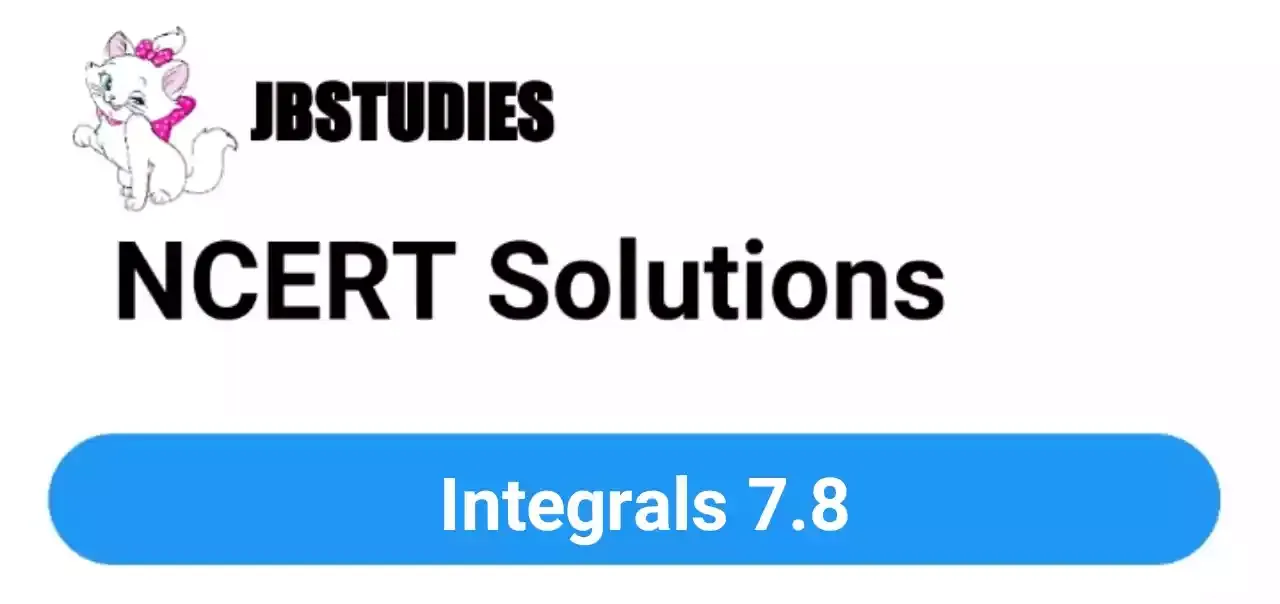NCERT Solutions Class 12 Maths Chapter-7 (Integrals)Exercise 7.8
NCERT Solutions Class 12 Maths from class
12th Students will get the answers of
Chapter-7 (Integrals)Exercise 7.8 This chapter will help you to learn the basics and you should expect at least one question in your exam from this chapter.
We have given the answers of all the questions of
NCERT Board Mathematics Textbook in very easy language, which will be very easy for the students to understand and remember so that you can pass with good marks in your examination.
Exercise 7.8
Q1. Evaluate the following definite integral as limit of sums : ∫baxdx∫abxdx
Answer. It is known that, ∫baf(x)dx=(b−a)limn→∞1n[f(a)+f(a+h)+…+f(a+(n−1)h)], where h=b−an Here, a=a,b=b, and f(x)=x ∴∫baxdx=(b−a)limn→∞1n[a+(a+h)…(a+2h),a+(n−1)h] =(b−a)limn→∞1n[(a+a+a+…+a)+(h+2h+3h+…+(n−1)h)]=(b−a)limn→∞1n[na+h(1+2+3+…+(n−1))] =(b−a)limn→∞1n[na+h{(n−1)(n)2}]=(b−a)limn→∞1n[na+n(n−1)h2]=(b−a)limn→∞nn[a+(n−1)h2] =(b−a)limn→∞[a+(n−1)(b−a)2n]=(b−a)limn→∞[a+(1−1n)(b−a)2]=(b−a)[a+(b−a)2] =(b−a)[2a+b−a2]=(b−a)(b+a)2=12(b2−a2)
Q2. Evaluate the following definite integral as limit of sums : ∫50(x+1)dx∫05(x+1)dx
Answer. Let I=∫50(x+1)dx It is known that, ∫baf(x)dx=(b−a)limn→∞1n[f(a)+f(a+h)…f(a+(n−1)h)], where h=b−an Here, a=0,b=5, and f(x)=(x+1)⇒h=5−0n=5n∴∫50(x+1)dx=(5−0)limn→∞1n[f(0)+f(5n)+…+f((n−1)5n)] =5limn→∞1n[1+(5n+1)+…{1+(5(n−1)n)}]=5limn→∞1n[(1+1+1…1)+[5n+2⋅5n+3⋅5n+…(n−1)5n]]=5limn→∞1n[n+5n{1+2+3…(n−1)}] =5limn→∞1n[n+5n⋅(n−1)n2]=5limn→∞1n[n+5(n−1)2] =5limn→∞[1+52(1−1n)]=5[1+52]=5[72]=352
Q3. Evaluate the following definite integral as limit of sums : ∫32x2dx
Answer. ∫baf(x)dx=(b−a)limn→∞1n[f(a)+f(a+h)+f(a+2h)…f{a+(n−1)h}], where h=b−an Here, a=2,b=3, and f(x)=x2 ⇒h=3−2n=1n∴∫32x2dx=(3−2)limn→∞1n[f(2)+f(2+1n)+f(2+2n)…f{2+(n−1)1n}] =limn→∞1n[(2)2+(2+1n)2+(2+2n)2+…(2+(n−1)n)2]=limn→∞1n[22+{22+(1n)2+2⋅2⋅1n}+…+{(2)2+(n−1)2n2+2⋅2⋅(n−1)n}] =limn→∞1n[(22+…+22)+{(1n)2+(2n)2+…+(n−1n)2}+2⋅2⋅{1n+2n+3n+…+(n−1)n}]=limn→∞1n[4n+1n2{12+22+32…+(n−1)2}+4n{1+2+…+(n−1)}] =limn→∞1n[4n+1n2{n(n−1)(2n−1)6}+4n{n(n−1)2}]=limn→∞1n⎡⎢
⎢⎣4n+n(1−1n)(2−1n)6+4n−42⎤⎥
⎥⎦ =limn→∞[4+16(1−1n)(2−1n)+2−2n]=4+26+2=193
Q4. Evaluate the following definite integral as limit of sums : ∫41(x2−x)dx
Answer. Let I=∫41(x2−x)dx=∫41x2dx−∫41 xdx Let I=I1−I2, where I1=∫x2dx and I2=∫xdx It is known that, ∫baf(x)dx=(b−a)limn→∞1n[f(a)+f(a+h)+f(a+(n−1)h)], where h=b−an For I1=∫41x2dxa=1,b=4, and f(x)=x2∴h=4−1n=3n I1=∫41x2dx=(4−1)limn→∞1n[f(1)+f(1+h)+…+f(1+(n−1)h)]=3limn→∞1n[12+(1+3n)2+(1+2⋅3n)2+…(1+(n−1)3n)2]=3limn→∞1n[12+{12+(3n)2+2⋅3n}+…+{12+((n−1)3n)2+2⋅(n−1)⋅3n}] =3limn→∞1n[(12+…+12)+(3n)2{12+22+…+(n−1)2}+2⋅3n{1+2+…+(n−1)}] =3limn→∞1n[n+9n2{(n−1)(n)(2n−1)6}+6n{(n−1)(n)2}]=3limn→∞1n[n+9n6(1−1n)(2−1n)+6n−62]=3limn→∞[1+96(1−1n)(2−1n)+3−3n] =3[1+3+3]=3[7]I1=21...(2) For I2=∫xdxa=1,b=4, and f(x)=x ⇒h=4−1n=3n∴I2=(4−1)limn→∞1n[f(1)+f(1+h)+…f(a+(n−1)h)]=3limn→11n[1+(1+h)+…+(1+(n−1)h)] =3limn→∞1n[1+(1+3n)+…+{1+(n−1)3n}]=3limn→∞1n[(1+1+…+1)+3n(1+2+…+(n−1))]=3limn→∞1n[n+3n{(n−1)n2}] =3limn→∞1n[1+32(1−1n)]=3[1+32]=3[52] I2=152 From equations (2) and (3), we obtain I=I1+I2=21−152=272
Q5. Evaluate the following definite integral as limit of sums : ∫1−1exdx∫−11exdx
Answer. Let I=∫1exdx…(1) It is known that, ∫baf(x)dx=(b−a)limn→∞1n[f(a)+f(a+h)…f(a+(n−1)h)], where h=b−an Here, a=−1,b=1, and f(x)=ex∴h=1+1n=2n ∴I=(1+1)limn→∞1n[f(−1)+f(−1+2n)+f(−1+2⋅2n)+…+f(−1+(n−1)2n)] ∴I=(1+1)limn→∞1n[f(−1)+f(−1+2n)+f(−1+2⋅2n)+…+f(−1+(n−1)2n)] =2limn→∞1n[e−1+e(−12n)+e(−1+22n)+…e(−1+(n−1)2n)] =2limn→∞1n[e−1{1+e2n+e4n+e6n+e(n−1)2n}] =2limn→∞e−1n[e2nn−1e2n−1]=e−1×2limn→∞1n[e2−1e2n−1] =e−1×2(e2−1)lim2n→0(e2n−1n)×2 =e−1[2(e2−1)2][limh→0(eA−1h)=1]=e2−1c=(e−1e)
Q6. Evaluate the following definite integral as limit of sums : ∫40(x+e2x)dx
Answer. It is known that, ∫baf(x)dx=(b−a)limn→∞1n[f(a)+f(a+h)+…+f(a+(n−1)h)], where h=b−an Here, a=0,b=4, and f(x)=x+e2x∴h=4−0n=4n ⇒∫40(x+e2x)dx=(4−0)limn→∞1n[f(0)+f(h)+f(2h)+…+f((n−1)h)] =4limn→∞1n[(0+e0)+(h+e2h)+(2h+e22h)+…+{(n−1)h+e2(n−1)h}]=4limn→∞1n[1+(h+e2h)+(2h+e4h)+…+{(n−1)h+e2(n−1)k}] =4limn→∞1n[{h+2h+3h+…+(n−1)h}+(1+e2h+e4h+…+e2(n−1)h)] =4limn→∞1n[(h(n−1)n)2+(e2hin−1e2h−1)] =4limn→∞1n[4n⋅(n−1)n2+(e8−1e8n−1)] =4(2)+4limn→∞(e8−1)e8n−18n)8 =8+4⋅(e8−1)8(limx→0ex−1x=1)=8+e8−12=15+e82
Chapter-7 (integrals)










